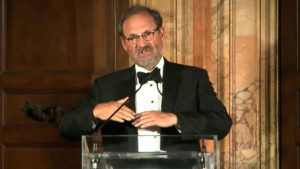Op-ed: After 30 years of the Religious Freedom Restoration Act, the law – and our liberty – are under attack
(The Daily Signal) – Thirty years ago today, President Bill Clinton signed into law the Religious Freedom Restoration Act, or RFRA, to protect what he called “the most precious of all…

(The Daily Signal) – Thirty years ago today, President Bill Clinton signed into law the Religious Freedom Restoration Act, or RFRA, to protect what he called “the most precious of all American liberties.”
Presidents of both parties have declared religious freedom to be one of our most fundamental freedoms, a “critical foundation of our nation’s liberty,” and “a fundamental human right.” Congress has unanimously recognized that religious freedom “undergirds the very origin and existence of the United States.” Yet only three decades after RFRA passed Congress with a total of only three votes against it and grassroots support from across the ideological spectrum, religious freedom is once again in danger.
People wishing to practice their faith without government interference were coming to these shores more than a century before James Madison made the “free exercise” of religion the first individual freedom in the Bill of Rights. First in colonial charters and state constitutions, then in the First Amendment itself, the law protected the exercise of religion as a preferred, inalienable right that, Madison wrote, takes precedence “over the demands of civil society.”
In his 1941 address to Congress, President Franklin Roosevelt included the exercise of religion as one of “four essential human freedoms.” The year before, the Supreme Court began articulating a strong legal standard, later called “strict scrutiny,” that would allow government interference only as a last resort and, even then, no more than necessary.
Only the “gravest abuses,” the court said in 1945, “endangering paramount interests, give occasion for permissible limitation” of religious freedom. The Supreme Court also recognized that government can burden religious practices in different ways, including through laws that appear to be “generally applicable,” that is, laws that are religion-neutral but still have a significantly negative effect on the exercise of religion.
That’s where things stood in 1990, when the Supreme Court changed everything. In Employment Division v. Smith, two Oregon state employees challenged their firing and denial of unemployment benefits for using peyote, a prohibited control substance, in their Native American religious ceremonies. No one questioned that strict scrutiny was the proper standard to determine whether the state’s actions violated the First Amendment. No one raised, briefed, or argued that issue, and addressing it was unnecessary to decide the case.
The Supreme Court addressed it anyway, turning the free exercise clause on its head. Going forward, Justice Antonin Scalia wrote for the court, strict scrutiny would be applied only when the government deliberately and explicitly targets the exercise of religion. Not a single free exercise clause case in the previous 50 years, however, involved such explicit religious restriction. Every case had instead been of the “generally applicable” kind, challenging the burdensome effect of government action that appeared religion-neutral.
Congress responded by enacting RFRA in 1993 to once again require that strict scrutiny be applied universally to all free exercise claims. Regardless of party or ideology, members of Congress and grassroots organizations united around a single principle: Everyone should be able to challenge government action that interferes with this special right.
While strict scrutiny puts a thumb on the scale in favor of religious freedom, courts still ruled for the government in a majority of free exercise clause cases prior to the Supreme Court changing the rules in Smith. Since then, the government wins almost every time.
Today, however, a campaign is underway to do to RFRA what the Supreme Court did to the free exercise clause. Several bills have been introduced in Congress to advance the Left’s agenda on issues such as LGBTQ rights and unrestricted access to abortion. That’s bad enough by itself, but these bills would block application of RFRA so that government could restrict, or even prohibit, religious practices that might slow down that agenda.
The Equality Act, for example, would change seven important federal statutes to prohibit discrimination on the basis of sexual orientation or gender identity in areas such as employment, housing, credit, or jury service. Professor Douglas Laycock, a prominent First Amendment scholar who helped write RFRA, has explained that the Equality Act “is not a good-faith attempt to reconcile competing interests. It is an attempt by one side to grab all the disputed territory and to crush the other side.”
In another example, the Women’s Health Protection Act would prohibit any government, down to the level of towns and villages, from doing anything that might make abortion less likely. Like the Equality Act, it would block any application of RFRA, depriving religious employers of any chance to challenge being forced to pay for employees’ abortions or health care workers any chance to challenge being required to participate in them.
Additionally, the Do No Harm Act would amend RFRA itself so that it would not apply to laws that prohibit discrimination or promote “equal opportunity.” These bills would immunize any government action in these broad areas from any challenge that the action compromised or undermined anyone’s right to practice their faith.
Introducing bills is one thing, but these attacks on religious freedom are supported by a growing number of organizations and members of Congress who backed RFRA in 1993. Back then, they demanded that strict scrutiny be applied universally; today, they want to quash any protection for religious practices they do not favor. At least 15 organizations that opposed any exception to RFRA in 1993 have endorsed one or more of the aforementioned bills that would gut RFRA today.
The American Civil Liberties Union, for example, signed a letter opposing any amendment to RFRA when it was enacted. Its president at the time, Nadine Strossen, testified before both the Senate and House Judiciary Committees that the exercise of religion is a “preferred” value and should be protected as a fundamental right. The ACLU has today endorsed all three of the RFRA-busting bills.
People for the American Way also opposed any limitation on RFRA’s application in 1993. Its then-president, John Buchanan, testified that RFRA should apply universally, “neither endorsing or opposing any particular faith or practice.” Today, however, the group promotes all of the bills that would make impossible the “balancing test” that Buchanan insisted in 1993 was so critical.
A total of 31 current senators and House members, 25 Democrats and six Republicans, were serving in either the Senate or House in 1993. All of them supported RFRA, with many also co-sponsoring the legislation and advocating its universal application in Senate and House floor speeches.
Today, however, all 25 Democrats have co-sponsored or voted for one or more of the bills that would tear apart the protection for religious freedom that they claimed was so essential just three decades ago.
Were the Founders correct that the right to exercise religion is a preferred inalienable right? The U.S. Constitution, federal statutes and treaties, and American presidents across parties and generations have said so.
RFRA stands for a very simple, yet profound, principle: This fundamental right belongs to everyone, and it should always be difficult for the government to undermine it. This “most precious of all American liberties,” as President Clinton put it, is today on shaky ground because the consensus behind that principle is crumbling.
The Senate Judiciary Committee’s 1993 report on RFRA called religious freedom “among the most treasured birthrights of every American.” Without a renewed commitment and a conscious decision to put this freedom ahead of politics, that birthright may be lost forever.



